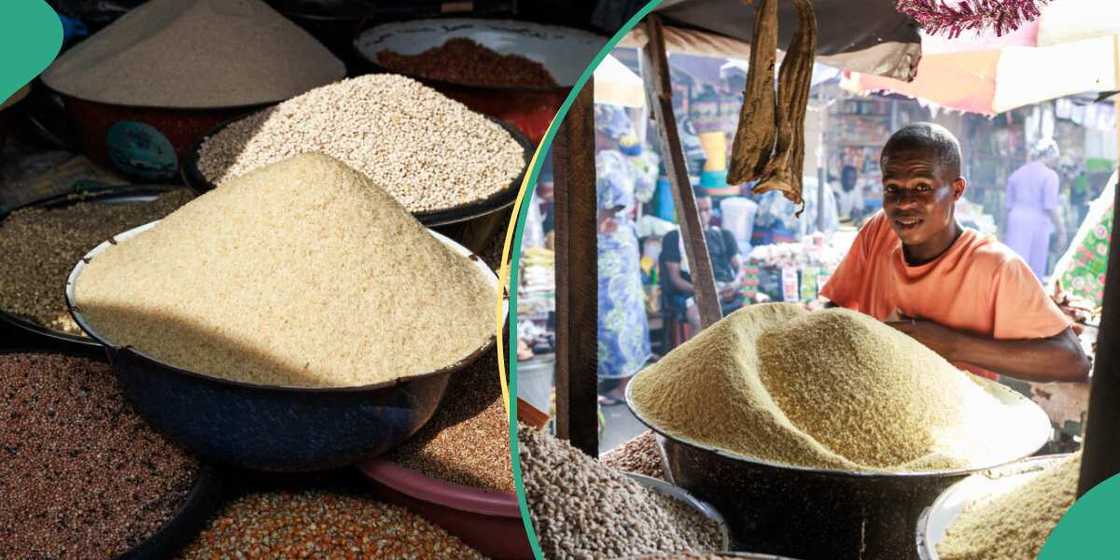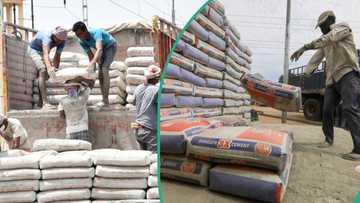“No More N60k/50kg”: Nigerians Groan as Rice Price Hits N77,000 Per Bag
- The price of rice has risen to a new high of N77,000 per bag from N50,000 recorded in December 2023
- The move has made many Nigerians adopt cost-cutting measures to cope with the current crisis
- The Nigerian government has issued a directive to release grains from the reserves to ease the pains
Pascal Oparada has over a decade of experience covering Tech, Energy, Stocks, Investments, and Economy.
Nigerians in their millions are now adopting severe cost-cutting measures to cope with the hardship caused by the astronomical rise in the prices of goods and services in the country.
The National Bureau of Statistics said in December 2023 that Nigeria’s inflation rate hit a 27-year-high of 28.9%.

Source: Getty Images
Food inflation pushes food prices to a new high
The December headline inflation increased by 0.72% compared to November 2023.

Read also
“No more N60k:” Air Peace, Dana, Max Air, others speak on airfare increase as fuel hits new high
PAY ATTENTION: Click “See First” under the “Following” tab to see Legit.ng News on your Facebook News Feed!
Analysts say the arrowhead of the recent inflation figures is food inflation, which has eroded household incomes in recent months.
The volatile exchange rate system exacerbates the situation, which makes food imports challenging.
The naira has experienced its worst performance against the US dollar, hitting an official rate of N1,500 per dollar at some points.
Sellers of food items in many states in Nigeria lamented that the high cost of rice, a staple food in Nigeria, has risen almost 200%.
Punch reports that long grain rice, which sold for N45,000 AND N50,000 in November 2023, now costs more than N70,000.
The remarkable increase in commodity prices has caused a nationwide hardship, leading to Nigerians protesting the high cost of living in many parts of the country.
Labour unions issue strike notice
Labour unions issued a strike notice to the Nigerian government to register their displeasure over the high cost of living in the country.
Despite the Nigerian government ordering the distribution of grains and other items from the grains reserves to ease the biting effects of the hardship, analysts have said that the measure could be better under the current situation.
Journalist and social affairs commentator Ishaya Ibrahim told Legit.ng that the best thing the Nigerian government should do is to sell the grains at subsidised rates to market women who will resell them at cheaper costs.
“If the grains are released, it might end up in private hands and worsen an already bad situation.
“The government should convert proceeds earned from the removal of petrol subsidies into food subsidies to ease the current pains as it is done in advanced countries.
Farmers should be encouraged to grow more crops in and off seasons by providing them subsidies and not loans,” Ibrahim said.
Prices of food, commodities in Nigeria are expected to rise in 2024
Legit.ng reported that the persistence of escalating food prices, as observed throughout this year, is expected to contribute to ongoing food security challenges, thereby impeding the African continent's ability to attain the goal of zero hunger by 2030.
This forecast is drawn from the 2023 Crop Production Report recently published by AFEX, a prominent African commodities player.
The report, unveiled over the weekend, underscores the substantial hurdles posed by food insecurity and inflation, particularly in Nigeria.
PAY ATTENTION: Unlock the best of Legit.ng on Pinterest! Subscribe now and get your daily inspiration!
Source: Legit.ng




